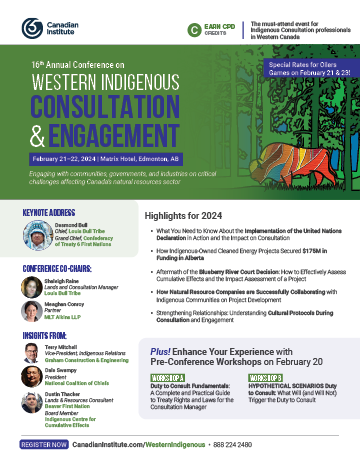2024 Agenda

Download 2024 Brochure
Flip through our 2024 conference brochure and discover what’s new this year.
- Jump to:
- At a Glance
- Day 1
- Day 2
- Print-friendly Format
Day 1 - Wednesday, February 21, 2024
| 7:30 |
Registration Opens and Breakfast Is Served |
| 8:30 |
Co-Chairs Opening Remarks |
| 8:45 |
Traditional Welcome |
| 9:00 |
Keynote Address |
| 9:30 |
Urban ATR as a Tool for Economic Sovereignty |
| 10:15 |
Morning Networking and Refreshment Break |
| 10:30 |
INDIGENOUS LEADERS PANELHow UNDRIP is Changing the Duty to Consult and the Evolving Meaning of Consultation – Done Well! |
| 11:30 |
Strengthening Rights Based Relationships in an Urban Context: Municipalities and the Duty to Consult |
| 12:30 |
Networking Luncheon |
| 1:45 |
LEGAL PANELHow Legal Cases are Affecting Consultation Practice |
| 2:45 |
Deep Dive into the Aboriginal Rights and Information System |
| 3:15 |
Afternoon Networking and Refreshment Break |
| 3:30 |
Roadmap: A Path Towards Economic Reconciliation |
| 4:15 |
Closing Remarks from the Conference Co-Chairs
|
Day 2 - Thursday, February 22, 2024
Day 1 - Wednesday, February 21, 2024
| 7:30 |
Registration Opens and Breakfast Is Served |
| 8:30 |
Co-Chairs Opening Remarks Meaghan Conroy  Shaleigh Raine |
| 8:45 |
Traditional Welcome |
| 9:00 |
Keynote Address Shaleigh Raine |
| 9:30 |
Urban ATR as a Tool for Economic Sovereignty Ryan M. Lake |
| 10:15 |
Morning Networking and Refreshment Break |
| 10:30 |
INDIGENOUS LEADERS PANELHow UNDRIP is Changing the Duty to Consult and the Evolving Meaning of Consultation – Done Well! Eriel Deranger  Callie Davies-Flett  Brian Fung  Robb Campre
|
| 11:30 |
Strengthening Rights Based Relationships in an Urban Context: Municipalities and the Duty to Consult Jaimy Miller  Morgan Bamford  Troy Chalifoux, B.A., L.L.B Municipalities, corporations, and industry are increasingly undertaking projects and partnerships with rights bearing First Nations and Métis communities, in regards to the duty to consult, Indigenous intergovernmental relations, and economic reconciliation in an urban context. |
| 12:30 |
Networking Luncheon |
| 1:45 |
LEGAL PANELHow Legal Cases are Affecting Consultation Practice Meaghan Conroy  Kate Kempton  William (Bill) Mcelhanney, K.C. Focusing on significant legal developments in the duty to consult, this session will concentrate on noteworthy legal advancements regarding the duty to consult. This session will explore recent case law, legislative changes and practical resources developed by Indigenous Peoples to fulfill the duty to consult and accommodate.
|
| 2:45 |
Deep Dive into the Aboriginal Rights and Information System Catherine James The Aboriginal and Treaty Rights Information System (ATRIS) is a web-based, geographic information system that locates Indigenous nations, groups, communities, and organizations and displays information pertaining to potential or established treaty rights. Join us for an overview of ATRIS, its main functions and how it impacts Western Canada. Participants will also learn how information is organized and how to conduct their own consultation research. |
| 3:15 |
Afternoon Networking and Refreshment Break |
| 3:30 |
Roadmap: A Path Towards Economic Reconciliation Delanie Bulldog
|
| 4:15 |
Closing Remarks from the Conference Co-Chairs
|
Day 2 - Thursday, February 22, 2024
| 8:00 |
Registration Opens and Breakfast Is Served |
| 9:00 |
Co-Chairs Opening Remarks Meaghan Conroy  Shaleigh Raine |
| 9:15 |
Aftermath of the Blueberry River Court Decision and how to Effectively Assess Cumulative Effects and the Impact Assessments of a Projects Bryn E. Gray  Carol M. Wildcat This session will focus on the precedent-setting British Columbia Supreme Court which ruled that the Treaty Rights of Blueberry River First Nation were infringed upon through the cumulative effects of decades of natural resource developments. Points of discussion will include:
|
| 10:15 |
Morning Networking Break |
| 10:30 |
How Natural Resource Companies are Successfully Collaborating with Indigenous Communities on Project Development Terry Mitchell
|
| 11:15 |
Strengthening Relationships: Understanding Cultural Protocols During Consultation and Engagement Terry Mitchell  Florence Glanfield, PhD Placing Indigenous knowledge at the forefront of consultation is crucial for ensuring meaningful engagement. In this session, our audience will acquire a deeper understanding of the utilization of consultation protocols to facilitate engagement on various topics of interest and concern to communities. Points of discussion will include:
|
| 12:15 |
Networking Luncheon |
| 1:15 |
Hot TopicIndigenous Economic Development: Balancing Community and Industry Priorities and Achieving Mutual Growth Opportunities in First Nation Communities Devin Gambler
|
| 2:00 |
Success StoriesAnalyzing the Success of Top-of-Mind Natural Resource Projects in Western Canada Melvin Abraham Examine the projects taking place in Western Canada and what you can learn from their successes. Learn how these projects will impact future participation and consultation, as well as the status and schedules of mining, forestry, and nuclear. The following projects will be discussed:
|
| 2:45 |
Networking Break |
| 3:00 |
How to Negotiate Business Contracts and Joint Venture Agreements for Indigenous Partnerships Jeremy Barretto  Monika Wilson  Jeremy Makokis
|
| 4:00 |
Resource Revenue Sharing Agreements: How Provincial Governments are Now Addressing Negotiations and What is Going to Court Harold Blyan  Todd Bailey Discover new ways of implementing resources revenue sharing into project agreements, from the natural resource projects, mining energy, gas, and forestry industry. |
| 4:45 |
Co-Chairs Closing Remarks, End of Conference |